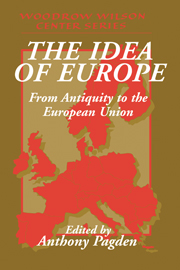Book contents
- Frontmatter
- Contents
- Acknowledgments
- Introduction
- 1 Europe: Conceptualizing a Continent
- 2 Some Europes in Their History
- 3 “Europe” in the Middle Ages
- 4 The Republican Mirror: The Dutch Idea of Europe
- 5 The Napoleonic Empire and the Europe of Nations
- 6 Homo Politicus and Homo Oeconomicus: The European Citizen According to Max Weber
- 7 The European Self: Rethinking an Attitude
- 8 European Nationalism and European Union
- 9 From the Ironies of Identity to the Identities of Irony
- 10 Muslims and European Identity: Can Europe Represent Islam?
- 11 The Long Road to Unity: The Contribution of Law to the Process of European Integration since 1945
- 12 The Euro, Economic Federalism, and the Question of National Sovereignty
- 13 Identity Politics and European Integration: The Case of Germany
- 14 Nationalisms in Spain: The Organization of Convivencia
- 15 The Kantian Idea of Europe: Critical and Cosmopolitan Perspectives
- Contributors
- Index
- Cambridge Cultural Social Studies
15 - The Kantian Idea of Europe: Critical and Cosmopolitan Perspectives
Published online by Cambridge University Press: 14 July 2009
- Frontmatter
- Contents
- Acknowledgments
- Introduction
- 1 Europe: Conceptualizing a Continent
- 2 Some Europes in Their History
- 3 “Europe” in the Middle Ages
- 4 The Republican Mirror: The Dutch Idea of Europe
- 5 The Napoleonic Empire and the Europe of Nations
- 6 Homo Politicus and Homo Oeconomicus: The European Citizen According to Max Weber
- 7 The European Self: Rethinking an Attitude
- 8 European Nationalism and European Union
- 9 From the Ironies of Identity to the Identities of Irony
- 10 Muslims and European Identity: Can Europe Represent Islam?
- 11 The Long Road to Unity: The Contribution of Law to the Process of European Integration since 1945
- 12 The Euro, Economic Federalism, and the Question of National Sovereignty
- 13 Identity Politics and European Integration: The Case of Germany
- 14 Nationalisms in Spain: The Organization of Convivencia
- 15 The Kantian Idea of Europe: Critical and Cosmopolitan Perspectives
- Contributors
- Index
- Cambridge Cultural Social Studies
Summary
Three illustrious historians—Anthony Pagden, Biancamaria Fontana, and John Pocock —have contributed to this volume, and it is not easy to follow them. Rather than advance another survey of ideas of Europe, I would like to accept one of the ideas they present and investigate it from what aspires to be a postimperial perspective. The idea I wish to examine is of Europe as a federation of independent states, and this as a prototype for the rest of the world. It is closely associated with Immanuel Kant and Benjamin Constant. For shorthand, I will call it the Kantian or federal idea of Europe. My thesis is that a survey of the critical attitude that has developed in response to this idea over the past two hundered years will change our idea of Europe and its relation to the rest of the world, from an Eurocentric to a more cosmopolitan conception.
THE KANTIAN IDEA OF EUROPE AND THE WORLD
Recall how Anthony Pagden, Biancamaria Fontana, and to some degree John Pocock presented a wide variety of ideas of Europe from various ages and went on to single out the idea associated with Kant and Constant, suggesting that it remains relevant today. This idea contains five main features. First, Europe is tending toward a federation of independent or sovereign states, each and every one of which has what Kant calls a “republican” constitution: that is, the formal equality of citizens under the law, the separation of legislature and executive, and representative government.
- Type
- Chapter
- Information
- The Idea of EuropeFrom Antiquity to the European Union, pp. 331 - 358Publisher: Cambridge University PressPrint publication year: 2002
- 19
- Cited by

